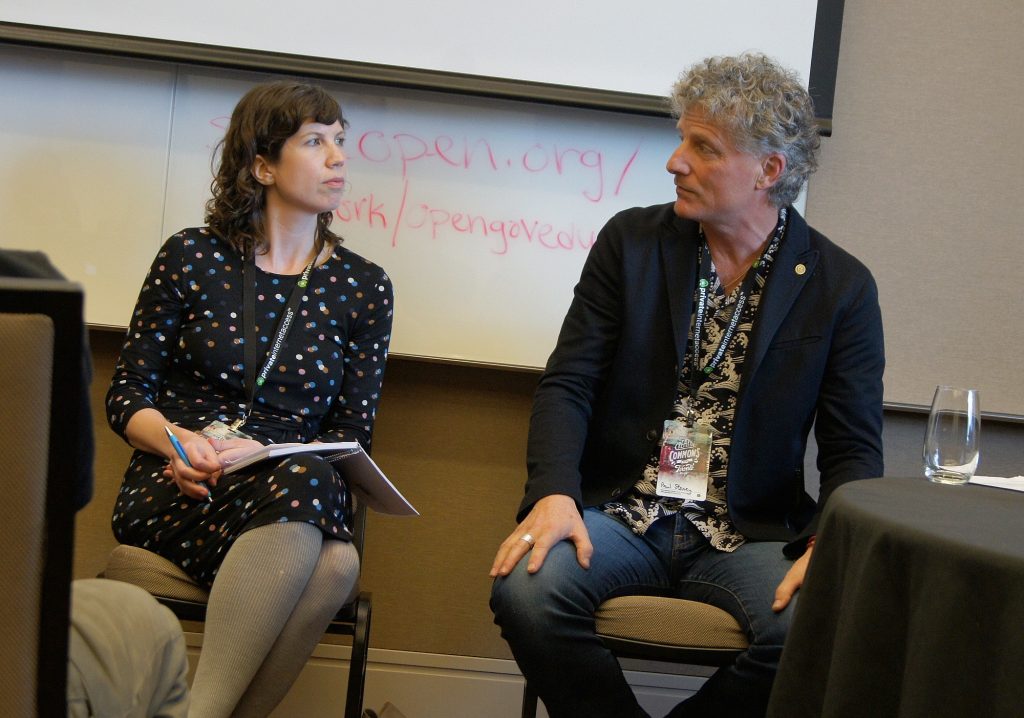Lively Discussions at the CC Summit Author Salon
EventsAndrew Malcolm is an author and a freelance communications specialist. His creative writing is published on his website, along with his author bio.
When I walked into the large ballroom to attend the author salon, I was pleased to find the attendance was modest enough that we could sit with all three authors in a circle and have a discussion that, as Paul Stacey described at the end of the session, “Felt more like a podcast than a workshop.” With each question igniting long conversations, and the discussions ultimately illustrating shared objectives and processes behind the three books, we all walked away happy to have the lively dialogues recorded, if not on our computers, at least in our memories.
The authors of the three books, Paul Stacey and Sarah Pearson, Maira Sutton, and Matt Thompson write about the commons, sharing, and economic models for working open. While Stacey and Pearson’s book Made with Creative Commons was the only one completed and in the hands of every attendee, all three authors shared intimately about their process as creators. Paul began the salon and said, “We started writing a book about open business models that were successfully earning profits, but as we interviewed entrepreneurs, creators and organizational leaders using CC licenses, we were surprised to find that our initial framework for understanding their success was misguided. Yes, they were earning profits, but that was never the objective of the work – their objectives were always something more socially conscious, and their earnings were meant to sustain the pursuit.”
.@maira from @Shareable talking urban commons and the real sharing economy (not uber) #ccsummit pic.twitter.com/2Wp1Rz6rNl
— Jane Park (@janedaily) April 29, 2017
Maira Sutton, talking about sharing cities, said she hoped to see the same diversity of objectives take the place of profiteering in our economies. As Manager of Community Engagement at Shareable, she campaigns to promote sharing and solidarity economics, and is working with them on a book called “Sharing Cities: Activating the Urban Commons” – a collection of case-studies and policies that exemplify commons-based sharing services.
Matt Thompson, a Mozilla Fellow, also introduced his book as one that advocates for a change in the way people work, though some specifics were still coming together: “My book is called Working Open: And I’ve had about a million ideas for a subtitle, but nothing solid yet.” All three projects seemed to bring surprises in the research that changed the author’s own understanding of what their work was illustrating, so a constantly shifting subtitle was understandable. Matt is interviewing people who are part of the most exciting open source projects and writing about how they are exemplifying the power of collaboration.
Needless to say, I was thrilled to have a chance to speak with authors who are working on the leading edge of a new era in publishing and licensing, but our conversation quickly turned to the biggest challenge each author faced – overcoming resistance to change.
Maira said, “What we want to do is convince cities to create policies that regulate the sharing economy so that they’re more conducive to community organizations, non-profits and coops. Still today most people think of companies like Uber and Airbnb when they think of the sharing economy, but their profit only objectives are proving to be bad for fairness, equality, and even safety for both providers and customers.”
Matt asked Maira, “Do you find city counsellors and policy makers are resistant to changing the rules to accommodate grass roots movements instead of companies?” This is how we know when an author salon is going well – when the authors start asking each other questions.
“Yes, but once we can point to other projects that are successful, they become much easier to convince. They’re just trying to make decisions that are best for the city, but it’s difficult for policy makers to decide to do anything new themselves. Once you can show that other cities have adopted policies and projects that work, that bring real value to their citizens, then it’s easy to get them on board,” she responded.
Matt said, “That’s what I find with many of the business leaders I’ve interviewed. The idea of working open, of revealing all their companies’ secrets and inviting outsiders in, really scares them. But they’re starting to notice that working open is actually creating the best possible products, that Wikipedia really is the best knowledge resource ever created. And despite GM and other large corporations investing heavily into developing the best self-driving cars, it’s OSVehicle’s open source platform for Edit that’s set to lead the way for the industry.”
The three books advocate to different audiences: Paul and Sarah’s to creators and organizations that could benefit from applying Creative Commons licenses to their products, Matt’s to business leaders who would benefit from creating open-work environments, and Maira’s to civic leaders who could create true sharing cities. Despite the disparate audiences, by the end of the session a commonality emerged – it’s examples and case studies that are most effective at changing minds and showing the value of commons-based approaches.
There are already people and organizations around the world working to ensure that the global economy is driven by something more than profits and growth. But they’re still the minority, and if that’s ever going to change, clearly we need to keep looking for those who are on the leading edge of social justice movements and telling their stories. Those stories can show leaders that objectives based in achieving equal rights to housing, food, knowledge, a sustainable environment and all our hopes for social change are already driving people to innovate and create with far more originality and ambition than ever before.
Posted 16 May 2017